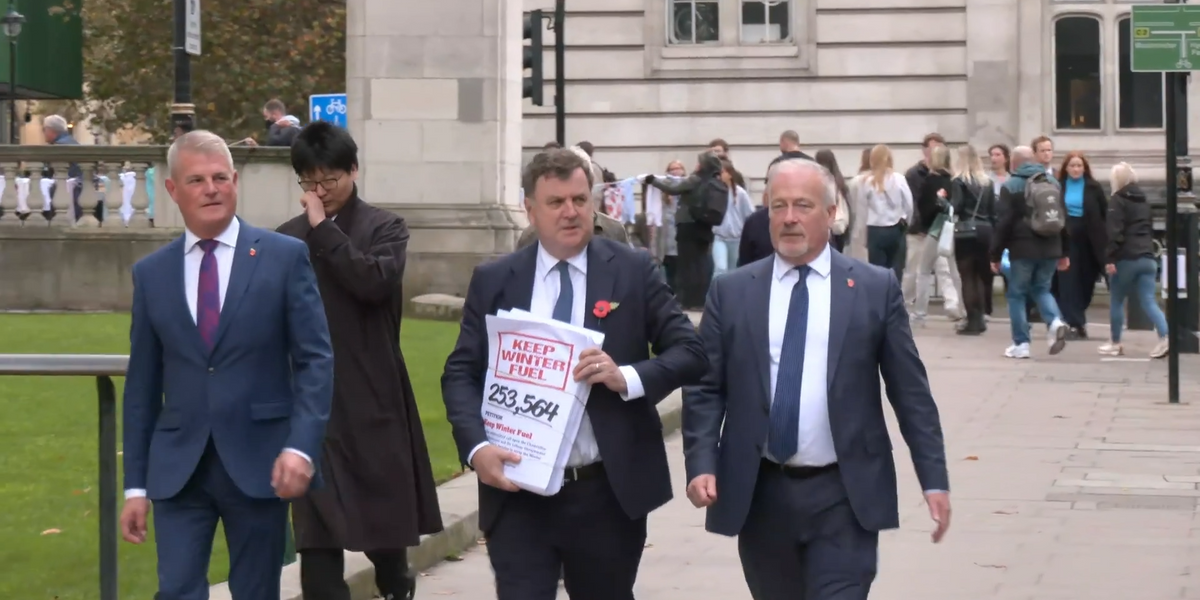Title: The Battle Over Winter Fuel Payments: A Call to Action from Conservative MP Mel Stride
In a significant political move, Conservative MP Mel Stride has taken a stand against the Labour government’s proposed cuts to Winter Fuel Payments, delivering a petition to the Treasury that has garnered over 250,000 signatures. This petition calls for the reversal of plans to means-test the benefit, which provides crucial financial support to pensioners during the winter months. Stride’s actions highlight the growing concern over the impact of these cuts on vulnerable members of society, particularly those living below the poverty line.
The Petition: A Collective Voice
The petition, which Stride presented to Chancellor Rachel Reeves, reflects a widespread sentiment among the public regarding the importance of maintaining universal access to Winter Fuel Payments. Stride emphasized the weight of the petition, both literally and figuratively, as it represents the voices of over a quarter of a million individuals who believe that the proposed changes are unjust. He stated, "It means 10 million pensioners losing out, and two-thirds of those pensioners below the poverty level will lose this benefit. And we don’t believe that’s right."
The Implications of Means-Testing
The proposed means-testing of Winter Fuel Payments has raised alarm bells among advocates for the elderly. Currently, the benefit is a universal payment, providing between £200 and £300 to pensioners based on their age. Introduced by Labour in 1997 and expanded to all pensioners in 2000, this support has been a lifeline for many during the colder months. Stride’s assertion that two-thirds of pensioners below the poverty line would be adversely affected by the cuts underscores the potential for increased hardship among the most vulnerable populations.
Political Choices and Priorities
In his remarks, Stride pointed to what he described as "political choices" made by the Labour government, suggesting that the decision to cut Winter Fuel Payments was made to fund other initiatives, such as inflationary wage increases for trade unions. He criticized the government for prioritizing these expenditures over the needs of pensioners, many of whom are already facing difficult choices between heating their homes and affording basic necessities like food. "We’ve just seen the energy price cap is about to go up by 10 percent," Stride noted, highlighting the pressing nature of the issue.
The Government’s Defense
In response to the backlash, Chancellor Rachel Reeves defended the decision to means-test Winter Fuel Payments as a necessary measure to address a financial "black hole" in the budget, projecting savings of £1.4 billion this year alone. She acknowledged the difficulty of the choice but attributed the challenging circumstances to the previous government’s policies. Labour leader Sir Keir Starmer echoed this sentiment, emphasizing the need to stabilize the economy before implementing broader changes.
Bipartisan Criticism
The proposed cuts have not only drawn ire from Conservative MPs but have also faced criticism from various quarters, including former Prime Minister Rishi Sunak, who accused the government of prioritizing "train drivers over pensioners." Unite union general secretary Sharon Graham has also called for a reversal of the policy, indicating that the issue transcends party lines and resonates with a broad spectrum of the public.
The Future of Winter Fuel Payments
As the political landscape continues to evolve, the fate of Winter Fuel Payments hangs in the balance. Stride remains hopeful that Chancellor Reeves will reconsider the proposed cuts, stating, "Tomorrow is Rachel Reeves’ chance to do just that." With the first Labour Budget on the horizon, all eyes will be on the government’s decisions regarding this vital support for pensioners.
Conclusion: A Call for Compassion
The debate surrounding Winter Fuel Payments is emblematic of larger societal issues concerning the treatment of vulnerable populations, particularly the elderly. As the cost of living continues to rise and energy prices soar, the need for robust support systems becomes increasingly critical. The voices of over 250,000 petitioners, as articulated by Mel Stride, serve as a powerful reminder of the importance of compassion and responsibility in governance. The coming days will reveal whether the government will heed this call or continue down a path that many believe is fraught with peril for those who need help the most.
